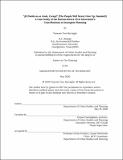| dc.contributor.advisor | Dayna Cunningham. | en_US |
| dc.contributor.author | Toro Barragán, Vanessa. | en_US |
| dc.contributor.other | Massachusetts Institute of Technology. Department of Urban Studies and Planning. | en_US |
| dc.date.accessioned | 2020-09-15T22:05:29Z | |
| dc.date.available | 2020-09-15T22:05:29Z | |
| dc.date.copyright | 2020 | en_US |
| dc.date.issued | 2020 | en_US |
| dc.identifier.uri | https://hdl.handle.net/1721.1/127597 | |
| dc.description | Thesis: M.C.P., Massachusetts Institute of Technology, Department of Urban Studies and Planning, May, 2020 | en_US |
| dc.description | Cataloged from the official PDF of thesis. | en_US |
| dc.description | Includes bibliographical references (pages 73-75). | en_US |
| dc.description.abstract | For ethnic minorities in Latin America and throughout the Global South, an expansion of citizenship rights, such as constitutional recognition of ethnic groups, has been undermined by State-sanctioned neoliberal policies, political corruption, and violent occupation of territories. State-led planning within these contexts is characterized by the use of centralized planning models that execute megaprojects which continue to represent dominant economic and political interests at the expense of ethnic communities, oftentimes, touting inclusive planning practices. In these instances, insurgent planning practices, collective actions from below, challenge the neoliberal mechanism of dominance through inclusion, with alternative forms of city-making. | en_US |
| dc.description.abstract | In Buenaventura, Colombia, a port city which is part of the constitutionally recognized Afro-Colombian and Indigenous ethnic-territory, 67% of the population cannot meet its basic needs for housing, water, sanitation, food, healthcare and/or education. This high rate of unmet basic needs sits in stark contradiction to the wealth flowing through its port economy, which brought in 1.7 billion USD in national custom revenues in 2016 and manages 30% of the nation's exports. In 2017, El Movimiento Civico de Buenaventura para Vivir con Dignidad y Paz en el Territorio (Buenaventura Civic Movement to Live with Dignity and Peace in the Territory) emerged as a multisectoral coalition to address structural inequality and violence. The movement successfully organized a 22-day civic strike to close the commercial activity of nation's third-largest port. An estimated 25% of bonaverenses, people of Buenaventura, participated either by blockading, marching or negotiating with the government. | en_US |
| dc.description.abstract | In an agreement to end the strike, the movement created an autonomous fund to finance a 10-year comprehensive development plan and secured 500 million USD of initial financing. Through interviews with movement leaders, social media, historical context, and analysis of the legal agreements, I describe three mechanisms of civic governance that the movement offers for an insurgent planning practice. The first is multisector solidarity that is built by a process of collective learning. The second mechanism looks at the committee structure of the Movimiento Civico, in which thematic committees are established to manage the priorities of the city. The third, is the legal framework that creates a mixed-management board of directors, with Movimiento Civico representatives and the State, for the autonomous fund and the 10-year comprehensive development plan. | en_US |
| dc.description.abstract | These mechanisms, forms propias de gobernanza (our own ways of governance), contest the relationship with the State and aim to restore a cosmovision (worldview) that reflects the ethnic-territory. | en_US |
| dc.description.statementofresponsibility | by Vanessa Toro Barragán. | en_US |
| dc.format.extent | 79 pages | en_US |
| dc.language.iso | eng | en_US |
| dc.publisher | Massachusetts Institute of Technology | en_US |
| dc.rights | MIT theses may be protected by copyright. Please reuse MIT thesis content according to the MIT Libraries Permissions Policy, which is available through the URL provided. | en_US |
| dc.rights.uri | http://dspace.mit.edu/handle/1721.1/7582 | en_US |
| dc.subject | Urban Studies and Planning. | en_US |
| dc.title | "¡El Pueblo no se rinde, Carajo!" (the people will never give up, Dammit!) : a case study of the Buenaventura Civic Movement's contributions to insurgent planning | en_US |
| dc.title.alternative | People will never give up, Dammit! : a case study of the Buenaventura Civic Movement's contributions to insurgent planning | en_US |
| dc.type | Thesis | en_US |
| dc.description.degree | M.C.P. | en_US |
| dc.contributor.department | Massachusetts Institute of Technology. Department of Urban Studies and Planning | en_US |
| dc.identifier.oclc | 1193556317 | en_US |
| dc.description.collection | M.C.P. Massachusetts Institute of Technology, Department of Urban Studies and Planning | en_US |
| dspace.imported | 2020-09-15T22:05:29Z | en_US |
| mit.thesis.degree | Master | en_US |
| mit.thesis.department | UrbStud | en_US |
